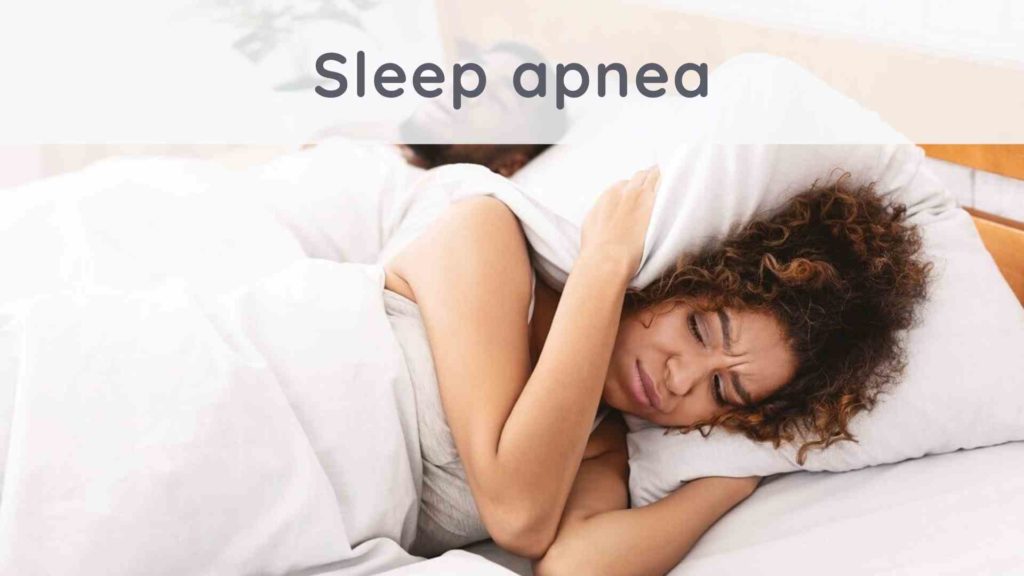Sleep apnea: how to breathe well at night?
Written by: Loris Vitry (holistic coach)
Validated by: Cathy Maillot (Osteopath)
Caution: If you have any medical questions or concerns, please speak to your doctor. Even if the articles on this site are based on scientific studies, they do not replace professional medical advice, diagnosis or treatment.

Sleep disorder is a condition that affects about 3 in 5 people.
In a particularly stressful society, sleeping well is now a luxury for many people.
We are faced with this disease bu how to heal naturally?
Read the article to understand sleep apnea and how to treat it naturally.
How do you know if you have sleep apnea?
Sleep apnea is a severe sleep disorder that damages our organism.
It affects a large part of the male population, but the causes are still quite unknown to the general public.
Indeed, many people have symptoms of sleep apnea without knowing the reasons.
Stress is one of the factors for a sleep disorder.
A person who is too stressed is likely to get a sleep disorder quickly.
Apnea symptoms appear on two levels.
You can find out if you have sleep apnea during the night and also during the day.
In general, symptoms are manifested by:
- repeated snoring;
- breathing difficulties;
- frequent urge to urinate during the night;
- waking up with a startle feeling of suffocation and suffocation;
- a particularly restless sleep;
- sleep paralysis manifested by nightmares.
During the day, you may find it challenging to concentrate and have signs of drowsiness.
You may have a feeling of discomfort, sluggishness, and headache.
Likewise, you may find it challenging to memorize things that ordinary seem easy.
In this case, see a doctor immediately.
What are the causes of sleep apnea?
Sleep apnea is mainly caused by a loosening of the tongue and throat muscles.
This malfunction allows air to circulate too freely and leads to breathing difficulties, which result in chronic sleep disturbances.
Besides, stress is also one of the reasons for sleep apnea, as we already said before.
A person who suffers from continuous stress will have trouble falling asleep once at night.
Stress is, therefore, a crucial element to apprehend as a natural treatment of sleep apnea.
What are the consequences of sleep apnea?
Suffering from this pathology is not without consequences.
Sleep apnea is a disease to be taken seriously.
In more pronounced cases, sleep apnea can cause serious illnesses such as type 2 diabetes, high blood pressure, and obesity can also be observed.
In the long term, the risk of a cardiovascular accident increases.
A chronic sleep disorder has serious negative consequences on quality of life.
It causes physiological dysfunction and counterproductivity.
A person with a sleep disorder usually finds it difficult to be efficient and productive during the day.
Memory and behavioral problems can arise.
Furthermore, it has been proven that a person suffering from sleep apnea generally has a shorter life expectancy.
All of these consequences are warning signs that should motivate you to start effective treatment for your chronic sleep disorder.
How to cure sleep apnea naturally?
As you can see, sleep apnea is an advanced stage of stress.
If you want to help reduce sleep apnea, you have to deal with stress first.
Stress manifests itself in hyperventilation.
This hyperventilation will cause a respiratory disorder, which will immediately trigger a sleep disorder.
To overcome this, practice intermittent breathing techniques.
To make it short, it is a natural method that adds pauses after each expiration, before the next inhalation.
This exercise is done several times during the day.
It will allow you to release the pressure and reduce stress before going to bed.
To naturally reduce and eliminate apnea, you also have the option of following a specific diet.
People who are likely to experience apnea are usually those who abuse alcohol and also tobacco.
A diet rich in fat is likely to lead to a pronounced weight gain, but obesity and sleep do not mix well.
We must balance our diet and consume less alcohol and tobacco.
Furthermore, the use of natural products would be of considerable benefit in the natural treatment of apnea.
Prefer the consumption of fruits, preferably before the meal.
Also, by mixing garlic and honey, you can make a drink, which will help you to ventilate your respiratory system better.
Garlic is a powerful natural remedy to help regulate blood pressure.
Also, favor the consumption of tea or herbal tea made from natural plants such as aloe vera.
These herbal teas are known for their precious help in relaxation.
By strictly following these different tips and remedies, you can considerably reduce the effect of sleep apnea.
Beyond all these remedies, there is also a more effective way to treat apnea naturally.
It’s the regular practice of a sport.
Exercising promotes external well-being but also internal well-being.
The practice of yoga, endurance running, or even weight training will allow your body to regulate your breathing properly and effectively.
Controlled breathing will have a significant impact on the quality of your sleep.
Also, sport contributes to the relaxation of the body and the elimination of stress.
By exercising, your hyperventilation is significantly reduced, and as a result, stress will no longer be a problem for you.
You will, therefore, be able to spend more pleasant nights of sleep.
In conclusion, sleep apnea is a severe condition, and consultation is compulsory for each person suffering from it.
But don’t forget to add to your treatment, all the instructions mentioned above.
A natural cure for sleep apnea is possible if and only if you apply discipline and perfect hygiene to your life.
Continue reading:
Asthma: how to care naturally?

